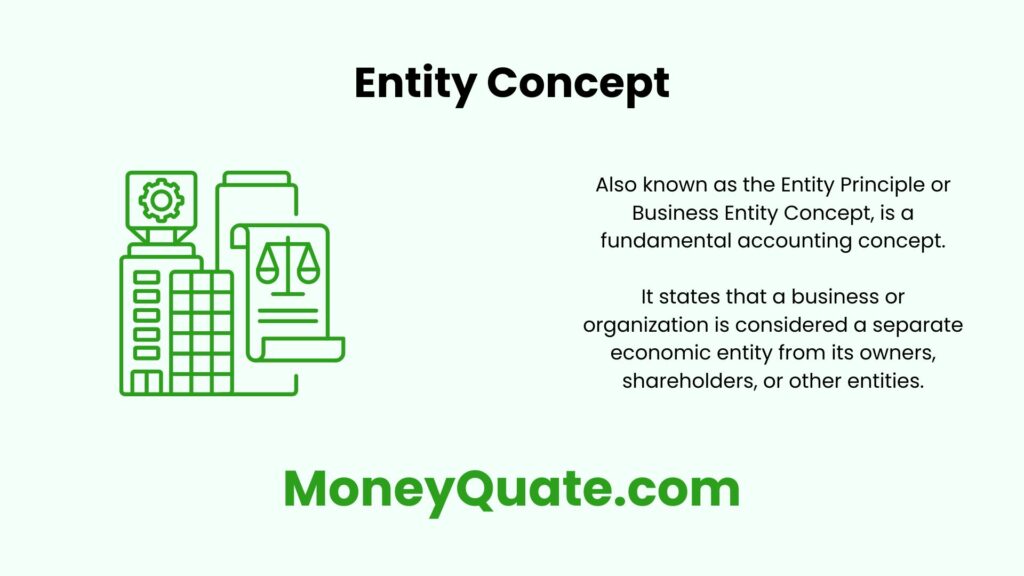Contents
- 1 Understanding the Entity Concept
- 2 Implications of the Entity Concept
- 3 Examples of Entity Concept
- 4 Benefits of the Entity Concept
- 5 Conclusion
- 6 FAQs
- 6.1 Why is the entity concept important in accounting?
- 6.2 How does the entity concept benefit business owners?
- 6.3 Can the entity concept apply to all types of businesses?
- 6.4 What are the implications of disregarding the entity concept?
- 6.5 How does the entity concept influence financial decision making?
Understanding the Entity Concept
The entity concept, also known as the separate entity concept, is a fundamental principle in accounting that delineates a clear division between the financial affairs of a business entity and those of its owners.
Essentially, it recognizes a business as a distinct legal entity, independent of its owners, shareholders, or partners.

Implications of the Entity Concept
Legal Distinction
The entity concept underscores the legal distinction between a business and its owners.
This recognition empowers the business to engage in contracts, own assets, and incur liabilities in its own capacity, separate from the individuals who own or manage it.
Financial Reporting
A critical implication of the entity concept is the mandate for maintaining separate financial records and reports for the business entity.
This segregation ensures transparency and accuracy in financial reporting, enabling stakeholders to evaluate the business’s financial performance effectively.
Liability Protection
One of the primary advantages of the entity concept is its provision of liability protection to the owners.
In practical terms, this means that in the event of the business debts or legal claims, creditors typically cannot pursue the personal assets of the owners, safeguarding their individual financial interests.
Decision Making
The clear demarcation between business and personal finances facilitated by the entity concept contributes to more informed decision-making processes.
With distinct financial records, owners can make strategic decisions regarding investments, financing, and business operations with greater clarity and confidence.
Examples of Entity Concept
Sole Proprietorship
In a sole proprietorship, the business and the owner are legally indistinguishable.
However, from an accounting standpoint, it is essential to maintain separation between the owner’s personal transactions and those of the business entity to adhere to the entity concept.
Corporation
A corporation stands as a separate legal entity from its shareholders.
While shareholders own shares of the corporation, they do not directly own its assets or bear its liabilities.
Financial statements of the corporation are prepared independently, reflecting the entity’s financial activities distinct from those of its shareholders.
Partnership
Similarly, partnerships operate as distinct legal entities from their partners.
The partnership entity maintains its financial records, ensuring that partners’ personal finances remain separate from the partnership’s financial affairs, thereby upholding the entity concept.
Benefits of the Entity Concept
Legal Protection
Owners benefit from limited liability, shielding their personal assets from business risks and liabilities.
This aspect of the entity concept is particularly appealing to entrepreneurs and investors seeking to mitigate potential losses.
Transparency
Separate financial reporting mandated by the entity concept enhances transparency in assessing the financial health and performance of the business.
Stakeholders can rely on accurate and comprehensive financial information to make informed decisions.
Investor Confidence
The entity concept instills confidence in investors and creditors regarding the reliability of financial information provided by the entity.
Knowing that the business operates as a distinct legal entity inspires trust and fosters a favorable investment climate.
Conclusion
The entity concept serves as a cornerstone of accounting principles, emphasizing the separation between a business entity and its owners.
By acknowledging the entity as a distinct legal entity, this concept ensures accurate financial reporting, liability protection, and transparency in business operations.
FAQs
Why is the entity concept important in accounting?
The entity concept ensures clarity and transparency in financial reporting by distinguishing between a business entity and its owners, facilitating accurate assessment of financial performance.
How does the entity concept benefit business owners?
Business owners enjoy limited liability protection, safeguarding their personal assets from business risks and liabilities.
Can the entity concept apply to all types of businesses?
Yes, the entity concept applies to various business structures, including sole proprietorships, corporations, and partnerships, ensuring consistency and transparency in accounting practices.
What are the implications of disregarding the entity concept?
Disregarding the entity concept can blur the lines between personal and business finances, leading to confusion, legal complications, and potential loss of liability protection for owners.
How does the entity concept influence financial decision making?
By maintaining separate financial records for the business entity, the entity concept facilitates informed decision making regarding investments, financing, and strategic planning, enhancing the overall efficiency and effectiveness of business operations.